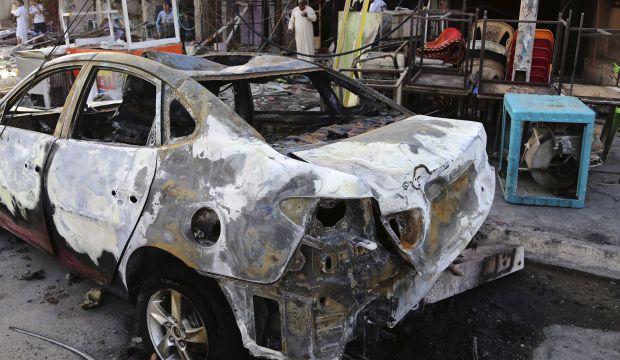
Civilians inspect the site of double car bombings in the northern Shi’ite district of Al-Hurriyah in Baghdad, Iraq, on October 1, 2014. (AP Photo/Karim Kadim)
Speaking to Asharq Al-Awsat, an Iraqi military official—who requested anonymity because he was not permitted to brief the media—said that ISIS’s inability to retaliate to airstrikes has led it to resort to launching reprisal attacks on civilians in Shi’ite-populated areas.
He said: “ISIS has realized that it is no longer possible to handle airstrikes, whether by Iraqi or international warplanes, with traditional methods. Therefore, they began now either to hide among civilians in a bid to trick the warplanes or to breach security around Baghdad.”
Over the past few days the Shi’ite-majority parts of Iraq have witnessed a sharp increase in synchronized terrorist attacks, with car bombs and mortar and artillery shells killing and injuring dozens of civilians.
Many experts believe that ISIS and other Islamist groups targeted by Western and Arab airstrikes have taken to attacking civilians in a bid to send a message that they are moving closer to the capital, and also force the security forces to re-deploy troops away from the front line.
By disturbing the security in Baghdad, ISIS is hopes the Iraqi army will be preoccupied with maintaining security in the residential areas and thus provide the Islamist group some room for maneuver, the military commander said.
In response, other military experts called for the US and its allies to change their tactics, and begin providing close air support to Iraqi forces, rather than bombing ISIS targets behind the lines.
In comments to Asharq Al-Awsat former interior ministry official Brig. Abdul Kareem Khalaf said: “It has become urgent for the international coalition airstrikes to be more focused on ISIS, particularly in the areas witnessing fighting.”
“Many of the airstrikes often take place in areas away from the military operations, such as [military] camps and depots,” he added, arguing that such attacks have less impact on ISIS than “targeting its militants, whether in the vicinity of Baghdad, or Tikrit, or Mosul.”

Trackbacks/Pingbacks